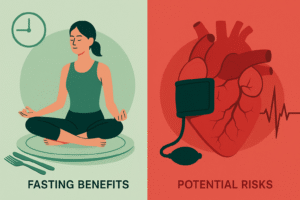Fun fact: The ancient Indian system of Ayurveda (which translates to “the science of life”) is over 5,000 years old—older than written language in many civilizations.
In the world of health, the past and the future are colliding in ways we never imagined. While artificial intelligence (AI) is transforming today’s medical landscape, an unexpected influence is making its presence felt—India’s ancient tradition of holistic health. From the dusty palm-leaf manuscripts of Ayurveda to the silicon-chip-powered algorithms of today’s healthcare, we are witnessing a curious but crucial confluence. The question isn’t whether technology can replace tradition—it’s whether it can finally learn from it.
This is a story not just about herbal concoctions and yoga postures, but about balance, bio-individuality, and the growing realization that modern medicine may have rushed ahead without looking back.
The Forgotten Science of Balance
Western medicine, brilliant as it is in acute care, often reduces the human body to a machine—parts to fix, symptoms to suppress, diseases to name. Ayurveda, on the other hand, looks at the whole picture: the mind, the body, the spirit, and the environment.
The principle of doshas (Vata, Pitta, and Kapha) in Ayurveda isn’t some outdated superstition. It’s a sophisticated system for understanding constitutional differences—similar, in some ways, to modern genetics and personalized medicine. While science is only beginning to explore how people react differently to the same drug, Ayurveda had this figured out millennia ago.
In AI terms, this would be called data segmentation. Every body is a dataset. Ayurveda’s approach? Hyper-personalization before algorithms even existed.
The Data That Modern Science Ignored
In a time when big data is being hailed as the future of diagnostics, it’s ironic that centuries of observational health data from Ayurveda were dismissed as “unscientific.” But that dismissal is slowly being re-evaluated.
Organizations such as the All India Institute of Ayurveda (AIIA) and the Ministry of AYUSH (Ayurveda, Yoga & Naturopathy, Unani, Siddha, and Homoeopathy) are actively working to digitize classical Ayurvedic texts, converting centuries of treatment data and case studies into modern formats. This is no longer mythology—it’s data waiting to be mined. Imagine an AI trained not just on modern clinical trials, but on centuries of empirical Ayurvedic treatment outcomes. This isn’t about romanticizing the past—it’s a vast, underexplored source of practical knowledge.

Case Study: Diabetes—Ancient Wisdom Meets Machine Learning
Take diabetes, a condition that plagues millions of Indians. Modern medicine treats it with insulin and blood sugar control. Ayurveda sees it as Madhumeha, caused by imbalances in metabolism and digestion. Treatment isn’t just a pill—it’s a lifestyle overhaul involving herbs like Gudmar (Gymnema sylvestre), mindful eating, sleep cycles, and gut health.
Today, technology-driven healthcare startups such as nference (a company specializing in machine learning for biomedical data analysis) and HealthifyMe (a digital health platform in India that uses AI for diet and fitness planning) are beginning to factor in broader wellness indicators—like lifestyle patterns, emotional well-being, and genetic predispositions.
The result? The future of managing chronic illness might not be just in hospitals, but in your kitchen, your sleep schedule, and your inner emotional world—something Ayurveda always knew.
AI Meets Ayurveda: What’s Already Happening
Patanjali’s Bioinformatics Division
Yes, the consumer giant Patanjali Ayurved (an Indian FMCG company selling Ayurvedic products and herbal medicine) has a research wing developing AI tools to study Ayurvedic formulations. By combining ethnobotanical knowledge with machine learning, they aim to predict which herbal combinations work best for which diseases.
IIT + AYUSH Collaboration
Institutes like the Indian Institute of Technology (IIT) are now working with AYUSH researchers to build AI-based diagnostic tools rooted in Ayurvedic principles. Instead of a one-size-fits-all model, these tools aim to provide personalized health assessments based on doshic imbalance patterns.
AI-Based Pulse Diagnosis
Startups like Nadi Tarangini (a health-tech company based in Pune) use sensors and AI to replicate the ancient Ayurvedic practice of Nadi Pariksha—pulse-based diagnostics. These tools analyse pulse signals to generate real-time reports on the individual’s health constitution and suggest interventions.

The Science of Slowness
We live in an age of speed—faster check-ups, 10-minute deliveries, and one-click prescriptions. But health doesn’t always respond well to urgency. Ayurveda reminds us of something AI still struggles with: the healing power of time, rest, and rhythm.
The growing medical fascination with circadian rhythms and biological clocks? Ayurveda called it Dinacharya (daily routine). Gut microbiome obsession? Ayurveda already recommended fermented foods, fibre-rich meals, and warm water 5000 years ago. The rise of biohacking practices such as cold-water immersion and time-restricted eating? All part of seasonal detox rituals in Ayurveda.
It turns out the future is just the past with better marketing.
What’s Holding It Back?
Scepticism isn’t the enemy—blind faith is. Ayurveda has flaws. Many formulations need rigorous clinical trials. Not everything that’s ancient is accurate, and not every herb is harmless. The danger lies in assuming one system must replace the other.
What we need is a fusion. AI can bring structure, scalability, and data precision. Ayurveda can bring intuition, wisdom, and context. Together, they can create a healthcare system that’s not just reactive but preventive, not just digital but deeply human.
But for that to happen, modern science has to stop acting like it discovered everything. And India must stop being ashamed of its own medical heritage.
Conclusion: A New Healthcare is Possible
It’s time to stop asking whether Ayurveda is “scientific enough.” The better question is: Can modern science be human enough?
The future of medicine will not just be about machines that learn, but traditions that teach. There’s no need to pit Ayurveda against AI—they can complement each other beautifully. We have to connect them. Because health is not a battleground of systems—it’s a collaboration of wisdoms.
And maybe, just maybe, the next great medical revolution won’t come from Silicon Valley—but from a turmeric-stained scroll in Varanasi, translated by AI, and rediscovered by a world finally ready to listen.
Author’s Note
As India sprints toward a high-tech future, we shouldn’t leave behind the slow, steady wisdom that kept generations healthy. This blog is not a call to reject modern science—but a reminder that ancient science may still have something to say. Let’s not ignore it.
G.C., Ecosociosphere contributor.




